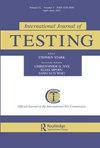基于响应时间的非参数Kullback-Leibler散度测度检测异常应试行为
IF 1.4
Q2 SOCIAL SCIENCES, INTERDISCIPLINARY
引用次数: 19
摘要
许多重要的高风险决策——大学录取、学业成绩评估,甚至是工作晋升——都依赖于有效的大规模评估中准确可靠的分数。然而,考生有时会通过抄袭其他考生的答案或提前练习考试题目来作弊,这可能会破坏这种评估的有效性,从而无法准确、准确地反映考生的表现。本研究的重点是利用一个新的非参数个人拟合指数,利用考生的反应时间来检测两种类型的作弊行为。通过-à-vis蒙特卡罗模拟以及对大规模评估数据的分析,研究了该方法的可行性。结果表明,该指标在检测前知作弊和极端单项作弊方面非常成功。本文章由计算机程序翻译,如有差异,请以英文原文为准。
Response Time Based Nonparametric Kullback-Leibler Divergence Measure for Detecting Aberrant Test-Taking Behavior
Many important high-stakes decisions—college admission, academic performance evaluation, and even job promotion—depend on accurate and reliable scores from valid large-scale assessments. However, examinees sometimes cheat by copying answers from other test-takers or practicing with test items ahead of time, which can undermine the effectiveness of such assessments in yielding accurate, precise information of examinees' performances. This study focuses on the utility of a new nonparametric person-fit index using examinees' response times to detect two types of cheating behaviors. The feasibility of this method was investigated vis-à-vis a Monte Carlo simulation as well as through analyzing data from a large-scale assessment. Findings indicate that the proposed index was quite successful in detecting pre-knowledge cheating and extreme one-item cheating.
求助全文
通过发布文献求助,成功后即可免费获取论文全文。
去求助
来源期刊

International Journal of Testing
SOCIAL SCIENCES, INTERDISCIPLINARY-
CiteScore
3.60
自引率
11.80%
发文量
13
 求助内容:
求助内容: 应助结果提醒方式:
应助结果提醒方式:


